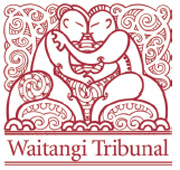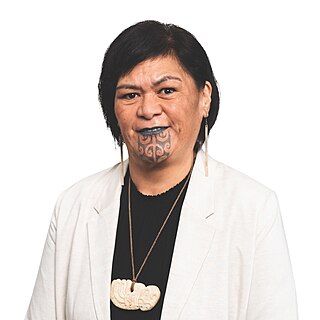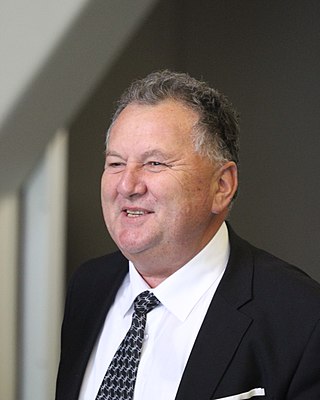The New Zealand Labour Party, also known simply as Labour, is a centre-left political party in New Zealand. The party's platform programme describes its founding principle as democratic socialism, while observers describe Labour as social-democratic and pragmatic in practice. The party participates in the international Progressive Alliance. It is one of two major political parties in New Zealand, alongside its traditional rival, the National Party.

The University of Waikato, established in 1964, is a public research university located in Hamilton, New Zealand. An additional campus is located in Tauranga. The university performs research in numerous disciplines such as education, social sciences, and management and is an innovator in environmental science, marine and freshwater ecology, engineering and computer science. It offers degrees in health, engineering, computer science, management, Māori and Indigenous Studies, the arts, psychology, social sciences and education.

Waitangi Day, the national day of New Zealand, marks the anniversary of the initial signing—on 6 February 1840—of the Treaty of Waitangi. The Treaty of Waitangi was an agreement towards British sovereignty by representatives of the Crown and indigenous Māori chiefs, and so is regarded by many as the founding document of the nation.

The Waitangi Tribunal is a New Zealand permanent commission of inquiry established under the Treaty of Waitangi Act 1975. It is charged with investigating and making recommendations on claims brought by Māori relating to actions or omissions of the Crown, in the period largely since 1840, that breach the promises made in the Treaty of Waitangi. The Tribunal is not a court of law; therefore, the Tribunal's recommendations and findings are not binding on the Crown. They are sometimes not acted on, for instance in the foreshore and seabed dispute.

Winston Raymond Peters is a New Zealand politician who has been the leader of New Zealand First since it was founded in 1993. He was re-elected for a fifteenth time at the 2023 general election, having previously been a member of Parliament (MP) from 1979 to 1981, 1984 to 2008 and 2011 to 2020. Peters has served as the 13th deputy prime minister of New Zealand and 25th minister of foreign affairs since November 2023.
Te Pāti Māori, also known as the Māori Party, is a political party in New Zealand advocating Māori rights. With the exception of a handful of general electorates, Te Pāti Māori contests the reserved Māori electorates, in which its main rival is the Labour Party.

Nanaia Cybele Mahuta is a New Zealand former politician who served as the Minister of Foreign Affairs of New Zealand from 2020 to 2023. In October 2022, Mahuta became the Mother of the House, having served continuously in the House of Representatives since the 1996 general election. She lost her seat in parliament in the 2023 general election.

Māori politics is the politics of the Māori people, who were the original inhabitants of New Zealand and who are now the country's largest minority. Before the arrival of Pākehā (Europeans) in New Zealand, Māori society was based largely around tribal units, and chiefs provided political leadership. With the British settlers of the 19th century came a new British-style government. From the outset, Māori sought representation within this government, seeing it as a vital way to promote their people's rights and improve living standards. Modern Māori politics can be seen as a subset of New Zealand politics in general, but has a number of distinguishing features, including advocacy for indigenous rights and Māori sovereignty. Many Māori politicians are members of major, historically European-dominated political parties, while others have formed separate Māori parties. For example, Te Pāti Māori, holding six of seven Māori electorates, is one such party.

Shane Geoffrey Jones is a New Zealand politician and a member of the New Zealand House of Representatives for the New Zealand First party.
Claims and settlements under the Treaty of Waitangi have been a significant feature of New Zealand politics since the Treaty of Waitangi Act 1975 and the Waitangi Tribunal that was established by that act to hear claims. Successive governments have increasingly provided formal legal and political opportunity for Māori to seek redress for what are seen as breaches by the Crown of guarantees set out in the Treaty of Waitangi. While it has resulted in putting to rest a number of significant longstanding grievances, the process has been subject to criticisms including those who believe that the redress is insufficient to compensate for Māori losses. The settlements are typically seen as part of a broader Māori Renaissance.

Moana Jackson was a New Zealand lawyer specialising in constitutional law, the Treaty of Waitangi and international indigenous issues. He was an advocate and activist for Māori rights, arguing that the New Zealand criminal justice system was discriminatory and leading work on constitutional reforms. In 1987 he co-founded Ngā Kaiwhakamarama i Ngā Ture. He also supported the rights of indigenous people internationally – for example, through leading the working group that drafted the United Nations Declaration on the Rights of Indigenous Peoples and sitting as a judge on the International Tribunal of Indigenous Rights in the 1990s.

Dame Jacinda Kate Laurell Ardern is a New Zealand former politician who served as the 40th prime minister of New Zealand and leader of the Labour Party from 2017 to 2023. She was a Labour member of Parliament (MP) as a list MP from 2008 to 2017, and for Mount Albert from 2017 to 2023.

Kelvin Glen Davis is a New Zealand politician. He is a member of the House of Representatives, and was a senior minister in the Sixth Labour Government and the deputy leader of the New Zealand Labour Party from 2017 to 2023.
The Universal Periodic Review (UPR) is a state monitoring mechanism of the United Nations Human Rights Council (HRC). It was established by General Assembly resolution 60/251 in 2006 to periodically review the protection and promotion of human rights in each of the 193 United Nations (UN) Member States. New Zealand has been reviewed twice via the UPR in 2009 and 2014.
Hobson's Pledge is a right-wing lobby group in New Zealand that was formed in late September 2016 to oppose affirmative action for Māori people. It is led by conservative politician Don Brash. The group aims to nullify the partnership between the Crown and Māori, remove the Māori electorates, abolish the Waitangi Tribunal, restrict tribal powers and "remove all references in law and in Government policy to Treaty 'partnership' and 'principles'".

The Sixth Labour Government governed New Zealand from 26 October 2017 to 27 November 2023. It was headed first by Jacinda Ardern and later by Chris Hipkins, as Labour Party leader and prime minister.
Matike Mai Aotearoa:Independent Working Group on Constitutional Transformation is a Māori initiative made up of constitutional experts and respected Māori leaders who consulted Māori between 2012 and 2015 and generated a report on constitutional transformation for Aotearoa New Zealand. The report was launched on Waitangi Day in 2016.
Te Aka Whai Ora was an independent New Zealand government statutory entity tasked with managing Māori health policies, services, and outcomes. The agency was one of four national bodies that oversee New Zealand's health system since 2022, along with the Ministry of Health, the Public Health Agency, and Te Whatu Ora. They replaced a system in which a single Ministry funded services through 20 district health boards (DHBs).

The Russia Sanctions Act 2022 is an Act of Parliament passed by the New Zealand Parliament that establishes the framework for autonomous sanctions against Russia in response to its 2022 invasion of Ukraine. This legislation would allow sanctions to be placed on those responsible for or associated with the Russian invasion of Ukraine including people, services, companies and assets. The Sanctions Act also allows for sanctions to be imposed on other states complicit with Russian aggression including Belarus. On 9 March 2022, the Russian Sanctions Act passed with unanimous support from all parties represented in Parliament.
Co-governance in New Zealand consists of various negotiated arrangements where Māori people and the Crown share decision-making, or Māori exercise a form of self-determination through a devolution of state power. Notable examples include the co-management of natural resources as part of the provision of Māori social services by Māori-focused entities, and statutory Māori representation in local government bodies. In addition Treaty of Waitangi settlements from 2008 often had co-governance agreements where the iwi involved worked with significant rivers, watersheds, coastlines and landmarks.












